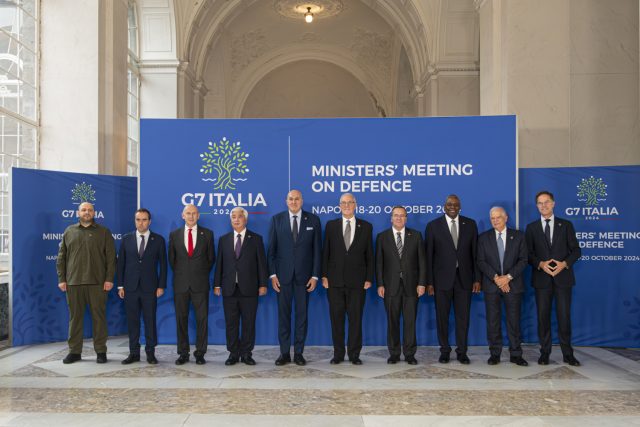
Within the global system that in recent years is experiencing the most intense crisis since the end of the Cold War, an eye on the debate of the G7 Defence – held in Naples from 18 to 20 October – is not only a duty of record, but above all a tool to understand the current international context and what the future developments on the chessboard might be.
THE THEMES OF THE G7 MEETING IN NAPLES
At the G7 meeting in Naples, at the presence of the defence ministers of the big seven, there was no shortage of topics for discussion. In fact, the final document ranged from the explicit condemnation of the nuclear rhetoric held by Russia in relation to the conflict in Ukraine, to the threats to the men of the Unifil mission in Lebanon – the object of attacks by the Israeli military in recent weeks. Among the topics, naturally, the regional crisis in the Middle East that also involves Iran and the new call for an immediate ceasefire in Gaza.
DE-ESCALATION AND WORLD STABILITY
In the face of the various emergencies considered by the ministers in Naples (of which we will speak later in detail), it cannot fail to dawn on them that the common demand is for action in accordance with international law, including humanitarian law. An urgent need for de-escalation and a return – albeit partial and dictated by the new realignments – to a world stability that can restore peace and development not only in the regions directly affected by the current conflicts, but also in the rest of the international scenario, which has been strongly affected by the events of the last three years. A theme that was also mentioned during his speech by Italian Minister Guido Crosetto.
THE CONFLICT IN UKRAINE
Naturally, the support for Ukraine was once again emphasised. A declaration that comes after almost three years of aggression by Russia, which, the final document signed by the Defence Ministers reads, ‘has implemented an attitude of confrontation and destabilisation on a global scale, even resorting to hybrid warfare and the irresponsible use of nuclear rhetoric’. The condemnation of Putin’s Russia could not fail to include an analysis of the increasingly close contacts with Iran. In this sense, the ministers expressed ‘concern’ especially in relation to the systems put in place between the two states to circumvent international sanctions, continuing the exchange of technology, especially in the military sphere. In this context it is the economic, military and technological support for Ukraine, reiterated once again in the summit’s final document, that serves as counterbalance to the contacts between Russia, Iran and the other partners that Putin has set in motion to continue his special military operation.
THE MIDDLE EAST CHAPTER
Unity is also needed on other fronts that can see the common interest of the big seven. This is why, in the final document of the Naples meeting, unity of intent was also pursued on the Middle East and the regional crisis triggered on 7 October 2023. In particular, the big seven condemned last year’s brutal terrorist attack by Hamas, emphasising that these acts triggered a spiral of violence that involved the entire region. Likewise, and this is the important element of cohesion, the need for an immediate ceasefire in Gaza, as well as the reactivation of the roadmap towards a two-state solution, is jointly supported. The issue of regional instability is also addressed by condemning the direct military attacks launched by Iran against the State of Israel on 13 April and 1 October. Furthermore, the final document emphasised the links between Tehran, Houthi, Hamas and Hezbollah, especially in relation to Iran’s support for these organisations capable of triggering an uncontrollable crisis and escalation in the region and beyond. Naturally, the defence ministers’ concern at the G7 summit also focused on the security of the UN Unifil mission in Lebanon. Particular emphasis was placed on the security that must be ensured for the peacekeepers by all parties of the conflict.



 Subscribe
Subscribe